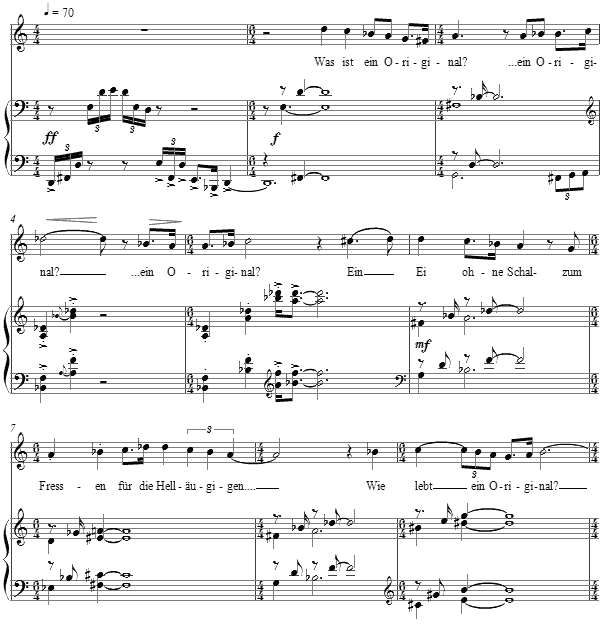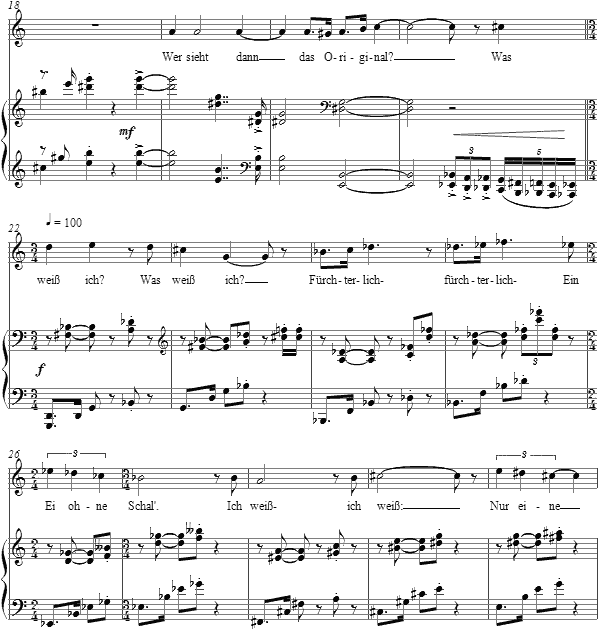Music and Texts of GARY BACHLUND
Vocal Music | Piano | Organ | Chamber Music | Orchestral | Articles and Commentary | Poems and Stories | Miscellany | FAQs
Was ist ein Original? - (2009)
Paul Scheerbartfor high voice and piano
Was ist ein Original?
Ein Ei ohne Schal'. –
Zum Fressen für die Helläugigen ...
Wie lebt ein Original?
In Angst und Qual. –
Schließlich, schließlich wird's nur
Gefressen von den Helläugigen ...
Wer sieht dann das Original?
Was weiß ich?
Fürchterlich – fürchterlich –
Ein Ei ohne Schal'.
Ich weiß – ich weiß:
Nur eine Rettung gibt's –
Kocht hart, kocht hart
Das Ei ohne Schal'!
Laß dich vom rauhen Leben
Hart kneten, du Original!
Dann liegst du den Helläugigen
Recht schwer im Magen –
Sie können dich dann nicht vertragen.[ 4 pages, circa 3' 00" ]
Paul Scheerbart
What is an original?
An egg without a shell. --
A feast for the bright-eyed...
How does such an original live?
In fear and torment.
Finally, finally it will have been
Gobbled by the bright eyed...
Who then sees an original?
What do I know?
Dreadful, dreadful,
An egg without a shell.
I know -- I know:
The is the only saving grace --
To be hard boiled, hard boiled
That egg without a shell!
From a rough life, let go,
crudely shaped, you original!
Then let those bright-eyed
get a stomach ache from --
They don't really suit you well.
Paul Scheerbart (1863-1915) was a German poet and author, who published also under the pseudonym Kuno Küfer. He began his studies of philosophy and history of art in 1885. In 1887 he worked as a poet in Berlin and tried to invent Perpetual motion machines (as in his 1910 Das Perpetuum mobile). In 1892 he was one of the joint founders of the Verlag deutscher Phantasten (Publishers of German Fantasists). He is perhaps best known for the book Glasarchitektur from 1914. After writing for various publications in 1897 he published Ich liebe Dich!, and then a bizarre poem collection Katerpoesie (Hangover Poems), followed by many fantastic tales. Scheerbart's essays about glass architecture influenced architects at that time. His own fiction works play on other planets, as one source said "he insisted that the universe is far too rich and complex to be comprehended by reason alone. Only naive wonder — the basis of the sublime — could promote the development of higher forms of understanding."
The setting of this strange poem from the collection, Die Mopsiade, seems to nominally be in/around G minor, though I have left a key signature off the score. The harmonies shift along relationship of minor thirds, such that the signature of G minor would simply have involved quite as real and courtesy accidentals as placing a key signature. Moreover the very modified verse form strays for a moment into what might be seen as B minor, very distant from G minor. The harmonic signature throughout is the minor triad with its major seventh included.
The break from duple meter offers a bent waltz time moment, as the poet questions "What do I know?" Here the harmonic successions echo previous statements in a more compact frame. While the poet suggests how terrible it might seem to be that original -- that "egg without a shell" -- nevertheless we see that it is also a recommendation for the life, an affirmation which necessitates making others sometimes a little ill -- "Recht schwer im Magen." I too use the expression, "bright boys," to refer to those high-profile characters, rich in self-promotion and widely peddled public pronouncements, in the same way as Scheerbart employs the image, "Helläugigen," in contrast to the "Original."
The score for Was ist ein Original? is available as a free PDF download, though any major commercial performance or recording of the work is prohibited without prior arrangement with the composer. Click on the graphic below for this piano-vocal score.


